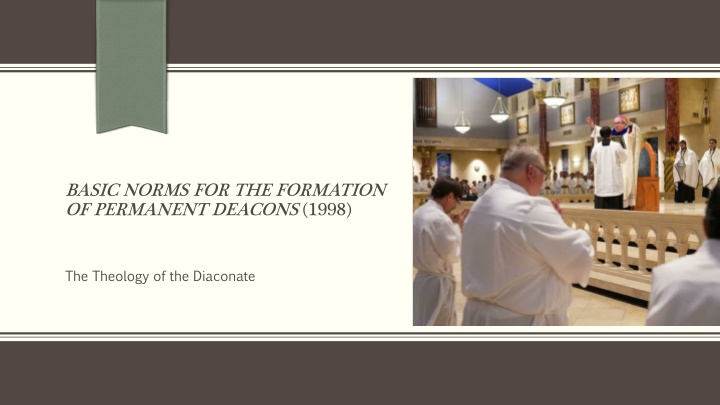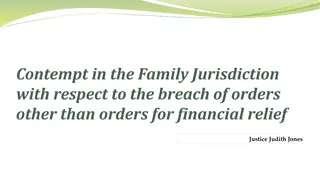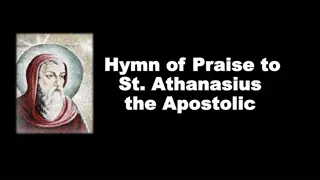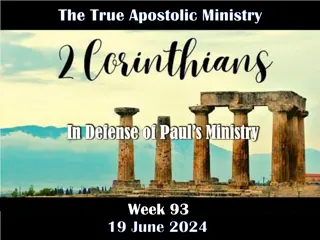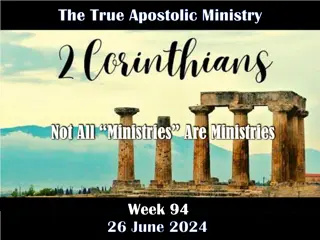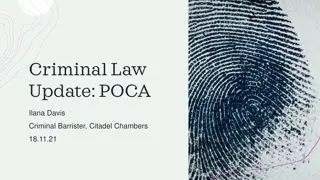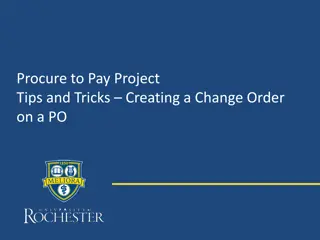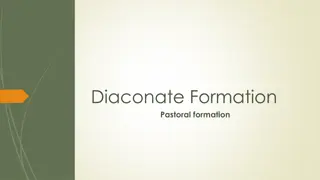The Sacrament of Orders: Understanding the Diaconate and Apostolic Ministry
The theology of the diaconate and the ordained ministry play a crucial role in the Catholic Church. Through the sacrament of orders, individuals are configured to Christ and act as representatives of Christ in their roles as deacons, priests, and bishops. This sacramental act surpasses mere election or delegation, as it confers sacred power that can only come from Christ himself through his Church. Bishops, priests, and deacons each have specific responsibilities within the apostolic ministry, serving as shepherds, teachers, priests of worship, and ministers of pastoral government.
Download Presentation

Please find below an Image/Link to download the presentation.
The content on the website is provided AS IS for your information and personal use only. It may not be sold, licensed, or shared on other websites without obtaining consent from the author.If you encounter any issues during the download, it is possible that the publisher has removed the file from their server.
You are allowed to download the files provided on this website for personal or commercial use, subject to the condition that they are used lawfully. All files are the property of their respective owners.
The content on the website is provided AS IS for your information and personal use only. It may not be sold, licensed, or shared on other websites without obtaining consent from the author.
E N D
Presentation Transcript
BASIC NORMS FOR THE FORMATION OF PERMANENT DEACONS (1998) The Theology of the Diaconate
The Ordained Ministry The holders of office, who are invested The holders of office, who are invested with sacred power with sacred power, are, in fact, dedicated to promoting the interests of their brethren, so that all who belong to the People of God, and are consequently endowed with true Christian dignity, may, through their free and well-ordered efforts towards a common goal, attain to salvation salvation. (Lumen gentium, 18) In order to (1) shepherd the People of shepherd the People of God God and to (2) increase its numbers increase its numbers without cease, Christ the Lord set up in the Church a variety of offices a variety of offices which aim at the good of the whole body. attain to
The Sacrament of Orders: Configuration Configures the recipient to Christ by a special grace of the Holy Spirit Configures the recipient to Christ by a special grace of the Holy Spirit, so that he may serve as Christ s instrument for his Church. By ordination, he is enabled to act as a representative of Christ, Head of the Church, in his triple office of priest, prophet, and king. (CCC, 1581) Through this sacrament, the mission entrusted by Christ the mission entrusted by Christ to his Apostles continues to be exercised in the Church until the end of time. It is the sacrament of apostolic ministry apostolic ministry. (CCC, 1536)
The Sacrament of Orders: The Sacramental Act The sacramental act The sacramental act of Ordination surpasses mere election, Ordination surpasses mere election, designation, or delegation designation, or delegation by the community, because it confers a gift of the Holy Spirit enabling the exercise of sacred power the exercise of sacred power, which can only come from Christ himself through his Church. (CCC, 1538) The one sent by the Lord speaks by virtue of Christ s authority [speaks to the community] in the name of Christ [speaks to the community] in the name of Christ. No one can bestow grace on himself; it must be given and offered
The Sacrament of Orders: Sacrament of Apostolic Ministry This sacrament of apostolic ministry comprises three (3) degrees three (3) degrees bishops, priests, and deacons. (Lumen gentium, 28) The Office of Bishop The Office of Bishop Together with priests and deacons as their priests and deacons as their helpers helpers, the bishops bishops have received: pastoral charge of the community [diocese], [presidency] preside in God s stead over the flock of which they are shepherds, [authority] teachers of doctrine, [high priesthood] priests of sacred worship, and [servants] ministers of pastoral government. (Lumen gentium, 20)
Sacred Ministers Sacred ministers are truly slaves of Christ (Rom 1:11); configured in the image of Him who freely took the form of a slave for us (Phil 2:7) The sacramental nature of ecclesiastical [apostolic] ministry is its character of service
The Diaconate: Scripture and Tradition St. St. Ireneus Ireneus (130-202 AD) sees the origin of the diaconate in the institution of the seven mentioned in the Acts of the Apostles (6:1-6) Lumen gentium 29 Lumen gentium 29: at the initial grade of sacred hierarchy are deacons, whose ministry has always been greatly esteemed in the Church
The Diaconate: Saint Paul Refers to them [diakonoi] and to the bishops [episkopoi] in the exordium of his Letter to the Philippians Letter to the Philippians (1:1) In his First Letter to Timothy, First Letter to Timothy, he lists the qualities and virtues which they should possess so as to exercise their ministry worthily (1 Tim 3:8-13) Deacon collaborators of St. Paul: Timothy (1 Thes 3:2) Epophros (Col 1:7) Tychicus (Col 4:7; Eph 6:21)
The Diaconate: St. Ignatius of Antioch Considers a Church without bishop, priest or deacon, unthinkable. St. Ignatius of Antioch (35 St. Ignatius of Antioch (35- - 108AD) 108AD) The ministry of deacons is the ministry of Jesus Christ, who was with the Father before time began and who appeared at the end of time. Deacons are ministers of the Church of God
The Diaconate: St. Ignatius of Antioch (35-108AD) The Letter to the Magnesians 6,1 The Letter to the Magnesians 6,1 Let the bishop place of the apostolic council and let the deacons favorites) be entrusted with the ministry of Jesus Christ who was with the Father from eternity and appeared at the end [of the world]. bishop preside in God s place, and the presbyters presbyters take the deacons (my special The Letter to the The Letter to the Trallians Trallians 3,1 3,1 Everyone must show the deacons respect. They represent Jesus Christ, just as the bishop has the role of the Father, and the presbyters are like God s council and an apostolic band. You cannot have a church without these.
The Diaconate: St. Ignatius of Antioch (35-108AD) Letter to the Letter to the Smyrneans Smyrneans 8,1 8,1 You should all follow the bishop follow the bishop as Jesus Christ did the Father. Follow, too, the presbytery the presbytery as you would the apostles; and respect the deacons respect the deacons as you would God s law. Nobody must do anything that has to do with the Church without the bishop s approval. Follow, too, Letter to the Letter to the Smyrneans Smyrneans 12,2 12,2 Greetings to your bishop [St. Polycarp] (he is such a credit to God!), and to your splendid presbytery and to my fellow slaves the deacons slaves the deacons my fellow
The Didascalia Apostolorum (230AD) The Teaching of the Twelves Apostles (Chapter XVI, iii.13) And let the deacons imitate the bishops in let the deacons imitate the bishops in their conversation their conversation and let them not love filthy lucre (1 Tim 3:8); but let them be diligent in the ministry. And in proportion to the number of the in proportion to the number of the congregation congregation of the people of the Church, so let the deacons be, that they may be able to take knowledge (of each) severally and refresh all; so that for the aged for the brethren and sisters who are in sickness for every one they may provide the ministry which is proper for him. the aged women who are infirm infirm, and sickness
The Didascalia Apostolorum (230AD) And let him [deacon] be ready to obey and to submit And let him [deacon] be ready to obey and to submit himself to the command of the bishop. himself to the command of the bishop. And let him [deacon] labor and toil in every place whether he is sent to minister or to speak of some matter to anyone. For it behooves each one to know his office and to be diligent in executing it. And be you (bishop and deacon) of one counsel, one And be you (bishop and deacon) of one counsel, one purpose, and one soul purpose, and one soul dwelling in two bodies.
The Didascalia Apostolorum (230AD) In the Gospel, you will find it written how our Lord washed the feet of us all and wiped them with the cloth [Jn 13.4-5]. Now this He did that He might show us (an example of) charity and brotherly love, that we also should do in like manner one to another. If then our Lord did thus, will you, O deacons, hesitate to do the like for them that are sick and infirm, you who are workmen of the truth, and bear the likeness of Christ? Do you therefore minister with love, and neither murmur nor hesitate; otherwise, you will have ministered as it were for men s sake and not for the sake of God, and you will receive your reward according to your ministry in the day of judgment. It is required of you deacons therefore that you visit all who are in need and inform the bishop of those who are in distress; and you [deacons] shall be his soul and his mind; and in all things you shall be taking trouble and be obedient to him [bishop]. mind; and in all things you shall be taking trouble and be obedient to him [bishop]. you [deacons] shall be his soul and his
From 5thCentury to Second Vatican Council For first five centuries the Diaconate flourished in the western Church After the 5 After the 5th century it experienced a decline it survived only as an intermediate step for candidates for priestly ordination The Council of Trent Council of Trent tried to restored (with its proper nature and original function in the Church) the permanent Diaconate, as it existed in ancient times thcentury
Second Vatican Council (1962-1965) Vatican II established that it will be possible for the future to restore the diaconate as a proper and permanent rank of the hierarchy (and confer it) even upon married men, confer it) even upon married men, provided they be of more mature age [35 years], and also on suitable young men [25 years] for whom, however, the law of celibacy must remain in force. (Lumen gentium, 29; St. Paul VI, Sacrum Diaconatus Ordinem, II, III)
Second Vatican Council (1962-1965) The reasons behind the restoration of the Diaconate as a proper and permanent rank of the hierarchy 1. A desire to enrich the Church with the functions enrich the Church with the functions of the diaconate; 2. The intention of strengthening with the grace of diaconal strengthening with the grace of diaconal ordination ordination those who already exercised many functions of the Diaconate; 3. A concern to provide with sacred ministers provide with sacred ministers for regions where there was a shortage shortage of clergy [priests and deacons]
Second Vatican Council (1962-1965) The restoration of the permanent Diaconate was in no manner in no manner intended to prejudice the intended to prejudice the meaning, role or flourishing meaning, role or flourishing of the of the ministerial priesthood ministerial priesthood, which must always be fostered because of its indispensability its indispensability
Saint Paul VI St. Paul VI, Sacrum Diaconatus Ordinem (1968) The Order of Deacons should not be considered merely a step towards the Priesthood Reasons for its restoration 1. It is an important enrichment for the mission of the important enrichment for the mission of the Church Church (a greater and more direct presence of sacred ministers in areas such as family, work, schools, as well as in the various ecclesiastical structures)
The Permanent Diaconate 2. Both convenient and useful, especially in mission territories in mission territories (Ad gentes 16), that men who are called to a truly diaconal ministry (whether liturgical or pastoral, charitable or social) be strengthened by the imposition of hands and more closely united to the altar to exercise their ministry more fruitfully through the sacramental grace of the diaconate
